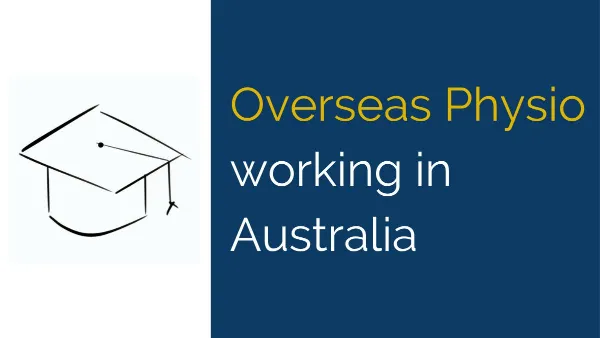The process for an overseas Physio working in Australia can seem a bit confusing, particularly when you’re doing your own research online.
We’ve summarised the key parts of the process below, and provided links to resources to help you clarify any specific conditions or issues for your situation.
Feedback from fellow Physios who have made the journey is a mix of frustration and validation. It can be a tricky process at times, and it takes longer than you expect.
But the prize is worth it! As an overseas Physio working in Australia, you’ve got a great lifestyle that opens up plenty of opportunities to travel.
In addition to obtaining your visa and registration, you can get a head start on the Australian job market by updating your CV and adding a course on “Understanding the Australian Health Care System” from The University of Queensland.
Organisations involved in the process
Department of Home Affairs
This is the Australian Federal Government department responsible for issuing visas, which grant permission to enter and/or remain in Australia.
You’ll need to apply directly to the department for this visa. They have a range of working visas for those who intend to come to Australia for paid work.
To be an overseas Physio working in Australia, you’ll need one of the working visa types as employers won’t risk hiring an ineligible foreign Physio without a working visa because they risk large financial penalties.
This process IS INDEPENDENT of your application for registration – approval for Physiotherapy registration and approval for a working visa are considered separately by different organisations.
AHPRA
AHPRA stands for “Australian Health Practitioner Regulation Agency“. Since 2010, they have been responsible for the registration of health practitioners in Australia.
This is the organisation that will grant you your registration, which gives your legal permission to work in Australia as a Physiotherapist.
An overseas Physio working in Australia needs to obtain registration for the first time, which involves passing an assessment by APC (details in the next section) as well as have an international criminal record check and current professional indemnity (PI) insurance.
To renew your Physio registration, you’ll need to meet ongoing professional development requirements (CPD) and maintain current PI insurance cover.
Australian Physiotherapy Council (APC)
The APC has been tasked by AHPRA with conducting assessments of foreign Physiotherapists.
They are the organisation that you’ll deal with to gain accreditation, which lets you then apply to AHPRA for your registration.
You’ll need to apply for your assessment via the APC website, with links below for the different application types.
Visa types
There are a range of working visas available to legally work in Australia as a Physiotherapist.
These include short stay visas, temporary working visas, permanent working visas and regional working visas.
The process for applying for any of these (and other) visas is well detailed on the Dept of Home Affairs website.
As a Physiotherapist, you’re classified as a “Skilled Occupation”, which is a qualified occupation that is desirable to work in Australia.
The cost of a working visa for Physiotherapists differs based on the visa type, but you’ll need to budget for upwards of A$450 for the application.
Applying for Physiotherapy registration in Australia
Standard assessment pathway
This application is processed and assessed by APC, with further details available here.
It’s a multi-stage process that begins with passing an Eligibility Assessment and Cultural Safety Training to gain an Interim Certificate. That part of the process takes around 4 weeks and the Cultural Safety Training costs around A$225 to complete.
The Interim Certificate allows you to apply to AHPRA for a restricted registration for the purpose of supervised practice to pass the next stages of your assessment.
After that, you’ll need to sit a written exam (online) and pass a clinical assessment. That part of the process takes 2-3 months (minimum).
Overall the Standard Assessment Pathway will take around 4 months and cost over A$7000 to complete. This doesn’t include additional costs, such as your registration fees and PI insurance.
Exempt countries
There are a number of countries that are exempt from the clinical assessment part of the process.
The exempt country refers to where you obtained your Physiotherapy qualification, not your country of residence or registration.
These countries are detailed below under “Approved FLYR countries”.
Fast-track countries (FLYR)
Which countries are eligible under the FLYR category?
You’re eligible to skip the clinical assessment part of the Standard Assessment Pathway if you obtained your Physiotherapy qualification in one of these countries:
- Canada
- Hong Kong (SAR of China)
- the United Kingdom
- Ireland
- Singapore (must be Bachelor-level qualification)
- South Africa
- Netherlands
How is the application different for FLYR countries?
Applying under the FLYR pathway not only saves you some time but also reduces the cost and travel involved in the application.
You don’t need to complete the clinical assessment, saving you 1-2 months and around A$4000. That means you won’t need to come to Australia to complete the clinical assessment, and all other parts of the application can be completed online from your home country.
This brings the cost of the application pathway to just over A$3000 (not including AHPRA registrations, cultural training course and other fees).
How to find out more
For more info on visa options and applications, head to the Department of Home Affairs.
For more info on the Physiotherapy application and registration process, you can look on the APC website or enquire with AHPRA via their website.
Already approved and looking for a head start?
If you’ve got your visa and registration sorted, it’s time to prepare your resume/CV and start approaching potential employers.
We’ve got tips and suggested structure for CV writing here. You can improve your chances by engaging a professional CV writing service, who can also help you with your cover letter.

